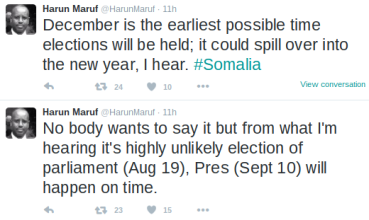Somalia parliament has paved the way to extend the government’s mandate amid concerns that the country will not hold elections scheduled for August and September 2016 on time.
Goobjoog reports:
Somali Federal Parliament has on this Wednesday made [a] crucial amendment to article 60 and 136 of the provisional constitution to safe the country in the transitional period. Article 60 of the current constitution [states] the term of office of the Federal Parliament is 4 years from the day of the announcement of the election results [but was amended to] the term of the office of Federal parliament ends from day that new parliament takes the oath.
Another amendment also delayed a referendum on the provisional constitution until the next government is installed.
The effort comes weeks after rumors that Somali President Hassan Sheikh Mohamud was planning to dissolve parliament ahead of elections.
The parliament in part may be seeking to address that existential threat — especially after the president showed he was willing to bypass legislators to approve the alternative election model by decree when parliament could not act quickly enough for the international community’s liking.
Then again, the President and Prime Minister have supported the idea of a mandate extension, so perhaps this fear is misplaced.
More broadly, the parliament probably has not followed the extensive technical and legal protocols outlined inArticle 134 of the provisional constitution that are required to make a constitutional amendment.
But the days of attempting to follow and ambiguous and contradictory provisional constitution are gone — if they were ever there in the first place. Now, real politik and political settlements are the name of the game.
The international community and Puntland have warned the parliament against extending its mandate, and the decision could serve as another distraction to the electoral process, as well as fuel suspicions that legislators seek to remain in their seats for as long as possible.
However, extending the government’s mandate — if followed by serious political negotiating — may be a risk worth taking compared to a government collapse and reversal of the modest progress to date.

After all, the parliament of President Hassan Sheikh’s predecessor — Sharif Sheikh Ahmed — extended its mandate for three years in February 2011 but was able to hold elections by August and September 2012.
Tough Road Ahead
While Somalia is not holding one person-one vote elections, Somali leaders must accomplisha number of challenging technical and logistical tasks in order to implement its alternative election model in the next two months, including:
- negotiating the composition of the 135 elders, some of whom have passed away or are disputed, who will pick the 13,750-strong electoral college. The college has the responsibility of electing members of parliament (MPs);
- arranging the travel plans, conference agendas, and security for thousands of electoral college members to convene in each of the regional locations for elections of members of parliament for the Lower House; for example, can Hiiraan and Middle Shabelle regions — which have continued to disagree on the format of its own state formation process — agree on common election protocols?
- dividing responsibilities of multiple regional election commissions with the federal election commission — all of which ostensibly will ensure that regional presidents ethically and transparently handpick their respective members of the Upper House;
- and lastly, addressing whether Banaadir region, which includes Mogadishu and is the largest source of domestic federal revenue, will receive representation in the Upper House.
Given the gargantuan effort required, it is no surprise that the parliament may want to pad its mandate to account for potential delays in the process.
After all, Somali leaders are trying to cram four years worth of work into 60 days, which ultimately will impact the quality and credibility of the transition process.






























